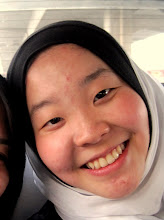I remember while going to Islamic School, several of the “seasoned” public-school-going Muslims around me would brag about their countless “non-Muslim” friends. Although in retrospect that type of bragging right seems ridiculous, at the time I was in awe. This wasn’t limited to just myself however, most everyone else were also shocked into instant admiration for the one who had “non-Muslim friends”. Now, as a student in the nation’s most populous public university, I can hardly say I am envious or in admiration of those who have non-Muslim friends. In fact, at this time of my life, I feel as though the several good non-Muslim friends I have can’t even compare to those timeless relationships I made throughout my life back when I was heavily involved with the Muslim community.
I’ve been shy for the majority of my life, one of the most frustrating attributes about myself that I have yet to overcome entirely. Even sitting in an Islamic school, in the same exact classroom with the same exact classmates for 4 years was not enough for me to even bravely say that I was “friends” with them. Yet, during those hours where I sat on the far corner of the room, I began daydreaming of crawling out of my shell and having countless non-Muslim friends. You can imagine the scenario I’m sure. Over time, these dreams kept growing into massive behemoths that gave the promise of reality when I shot myself into a large university such as ASU. However, given my own personality and the cruelty of reality, my fragile dreams were shattered. That’s not to say I hid in a dark corner and mumbled riddles under my breath for the two years I’ve been here, however. With my own wily ways, I managed to maintain a justified number of friendships. Some of them became stronger and more resilient than others. In fact, I could go so far as to say, some reached the level of “best friend-ness”. According to my previous youthful high school standards, this should have been the peak of my friendship happiness scale. However, after a while, I realized it wasn’t.
All humans have a certain comfort zone, and for some reason, Muslims (or at least for the several hundreds of Muslims I’ve met) have a much more open comfort zone for people of their religion as opposed to say, laymen Christians or Jews. For instance, perhaps this feeling is exclusive to myself, but no matter where I go, whenever I come within 30 feet of a hijabi sighting, my heart will soar, my eyes will enlarge, my feet will start dancing and the next thing that poor girl will see is a frantic Chinese Muslim waving emphatically while screaming blurs of “salaams” at her. Similarly, it only takes one meeting and a half for me to first begin bear- hugging most of my new hijabi acquaintances as though we’ve been friends for years. Not having researched this, I can’t say why this happens. However, it was because of this peculiar enlarged comfort zone that I felt this sense of belonging among Muslims whose identity or personality I had no notion of, and that sense of missing that special something when laughing my feet off with non-Muslim friends; because, as much as we share similar traits or beliefs with our non-Muslim best friends, there is a constant barrier of religion.
Although sometimes we become frustrated with the nonexistent understanding of personal space, this sort of bonding between those of the same religion is irreplaceable. It is beyond the building of a relationship based on similar attributes or thoughts. Because if we do follow our religion in the same way, this similarity will instantly be a part of the foundation of a relationship between Muslims, and thus our Muslim friendships will become closer than our non-Muslim friendships simply because there are far more similarities beyond the same religious beliefs, ideals and thoughts.
I’m sure most of us have had some one or other mention to us the power of the people. This essay is no different. I’m definitely not emphasizing that we should drop all our non-Muslim friends and go running for cover with the “safe crowd of Muslims”, however I do feel that it’s important to help your Muslim friends and appreciate them more than your non-Muslim friends. This probably sounds brutal, however when you really get down to it, your non-Muslim friends are no more obligated to help you than they do a complete stranger. On the other hand, Muslims are obligated to help other Muslims (and of course non-Muslims). And for that reason, I say this: We need to get it together. Muslims aren’t doing a bad job of unity per se, but it could certainly use a little improvement. I realize that overcoming past grievances and conflicts among one another is tough; however we are Muslim, and to give up on the argument first, to forgive first, to extend your hand to the other first is your DUTY. As painful as your experience may have been with one Muslim family or one Muslim individual, you must realize that until we stand together, we as the followers of Islam will never define it as a religion.
